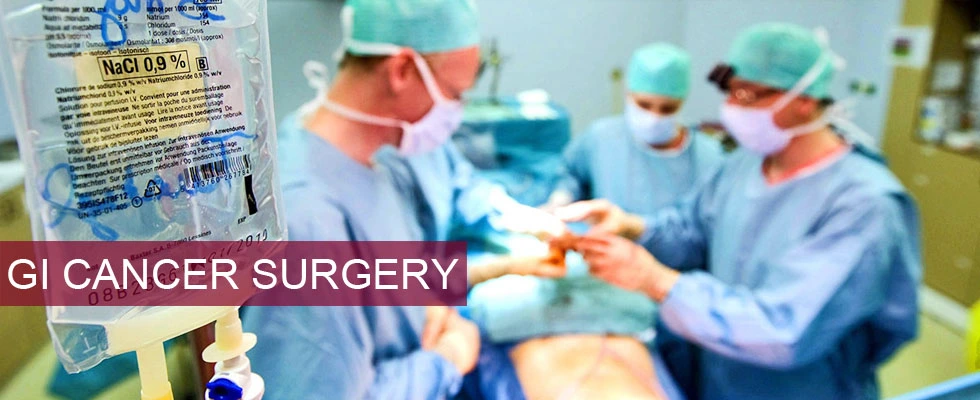Call Now:
+91 93308 06699 (Argha - Secretary)
Dr. Suddhasattwa Sen
GI Cancer Surgeon in Kolkata, West Bengal
MBBS (Gold medalist), MS (Gold medalist), DNB (All India Gold medalist), MNAMS (IND), MRCS (UK), FICS (USA), DNB (SGE & HPB), FMAS (AMASI), Fellow HPB & Liver Transplant (Sir Gangaram, Apollo, Del), CC Lap Solid Organ Surgery (Ethicon), CC Endohernia (Ethicon), CC Lap Colorectal (Galaxy, Pune) / Lap UGI surgery and VATS (Calicut), OB. Fellow HPB & GIS (SGPGIMS, Lucknow / GB Pant, Del).
Sr. Consultant and Former Head of Dept. Dept of GI HPB Surgery and GI HPB Oncosurgery, AMRI Hospital, Dhakuria, Kolkata.
Jt Director & Sr. Consultant || GI HPB and GS Dept || Medica Superspecialty Hospital, Kolkata (Former)
Formerly Sr. Consultant Apollo Gleneagles, Fortis Kolkata, Belle Vue Kolkata, CMRI, Woodlands, EEDF & SASK.
Gi Cancer Surgery
GI CANCERS
• Oesophagus Cancer
• Stomach Cancer
• Duodenal Cancer
• Pancreatic Cancer
• Periampullary Cancer
• Gallbladder Cancer
• Liver Cancer
• Bile Duct Cancer
• Splenic Tumor
• Colon Cancer
• Small Bowel Cancer
• Rectal Cancer
• Anal Cancer
• Retroperitoneal Cancer
• Mixed Types
• Advanced Types
SURGERIES
• Liver Resection
• Radical Cholecystectomy
• Bile Duct Excision
• Whipples
• Gastrectomy
• Oesophagectomy
• Combined Resection
• Multiorgan Resection
• Colorectal Resection
• APR
• LAR
• ELAPE
• Small Bowel Resection
• Vascular Resection
• Retroperitoneal Cancer
Is stomach cancer usually fatal?
In its early stages, stomach cancer is very treatable. Unfortunately, early stomach cancer causes few symptoms. Usually, a diagnosis is made when the cancer is more advanced. Because it can take some time to identify stomach cancer, only about 10% of people are diagnosed while it's still in the early stages.
Surgery for Stomach Cancer
Surgery is part of the treatment for many different stages of stomach cancer if it can be done. If a patient has a stage 0, I, II, or III cancer and is healthy enough, surgery (often along with other treatments) offers the only realistic chance for cure at this time.
Surgery may be done to remove the cancer and part or all of the stomach and some nearby lymph nodes, depending on the type and stage of stomach cancer. The surgeon will try to leave behind as much normal stomach as possible. Sometimes other organs will need to be removed as well.
Even when the cancer is too widespread to be removed completely, patients may be helped by surgery because it may help prevent bleeding from the tumor or prevent the stomach from being blocked by tumor growth. This type of surgery is called palliative surgery, meaning that it relieves or prevents symptoms but it is not expected to cure the cancer.
The type of operation usually depends on what part of the stomach the cancer is in and how much cancer is in the surrounding tissue. Different kinds of surgery can be used to treat stomach cancer:
Endoscopic Resection
Endoscopic mucosal resection and endoscopic submucosal resection can be used only to treat some very early-stage cancers, where the chance of spread to the lymph nodes is very low.
These procedures do not require a cut (incision) in the skin. Instead, the surgeon passes an endoscope (a long, flexible tube with a small video camera on the end) down the throat and into the stomach. Surgical tools can be passed through the endoscope to remove the tumor and part of the normal stomach wall around it.
These are not done as much in the United States as they are in countries (like Japan) where stomach cancer is more common and more often found at an early stage due to screening. If you are going to have this kind of surgery, it should be at a center that has experience with this technique.
Subtotal (partial) Gastrectomy
This operation is often recommended if the cancer is only in the lower part of the stomach. It is also sometimes used for cancers that are only in the upper part of the stomach.
Only part of the stomach is removed, sometimes along with part of the esophagus or the first part of the small intestine (the duodenum). The remaining section of stomach is then reattached. Some of the omentum (an apron-like layer of fatty tissue that covers the stomach and intestines) is removed as well, along with nearby lymph nodes, and possibly the spleen and parts of other nearby organs.
Eating is much easier after surgery if only part of the stomach is removed instead of the entire stomach.
Total Gastrectomy
This operation is done if the cancer has spread throughout the stomach. It is also often advised if the cancer is in the upper part of the stomach, near the esophagus.
The surgeon removes the entire stomach, nearby lymph nodes, and omentum, and may remove the spleen and parts of the esophagus, intestines, pancreas, or other nearby organs. The end of the esophagus is then attached to part of the small intestine. This allows food to move down the intestinal tract. But people who have had their stomach removed can only eat a small amount of food at a time. Because of this, they must eat more often.
Most subtotal and total gastrectomies are done through a large incision (cut) in the skin of the abdomen. In some centers, they can be done using laparoscopy, which allows the stomach to be removed through several smaller cuts in the abdomen. Although this approach shows promise, many doctors feel that this needs to be studied further before it can be considered a standard treatment for stomach cancer.
Can 4th stage stomach cancer be cured?
Stage IV stomach cancer has spread to distant organs, a cure is usually not possible. But treatment can often help keep the cancer under control and help relieve symptoms.
How long do you have to live if you have stomach cancer?
Of course, many of these people live much longer than 5 years (and many are cured). To get 5-year survival rates, doctors have to look at people who were treated at least 5 years ago. Improvements in treatment since then may result in a better outlook for people now being diagnosed with stomach cancer.
How long does it take to recover from colon cancer surgery?
Traditional surgery results in an average hospital stay of a week or more and usually 6 weeks of recovery. Less invasive options are available to many patients facing colon surgery. The most common of these is laparoscopic surgery, in which smaller incisions are used.
Can you be cured from stomach cancer?
Stomach cancer may be treated with surgery, radiation therapy, chemotherapy, targeted therapy, or immunotherapy. Descriptions of these common treatment options for stomach cancer are listed below. ... It can be difficult to cure stomach cancer because it is often not found until it is at an advanced stage.
How long does it take to recover from bowel surgery?
You can expect to spend 7-8 days in hospital (slightly less on average if the procedure is done laparoscopically) and 7-8 weeks before you feel back to normal (4-5 weeks after laparoscopic bowel surgery.
How long is stomach cancer surgery?
The surgeon removes the entire stomach, nearby lymph nodes, and omentum, and may remove the spleen and parts of the esophagus, intestines, pancreas, or other nearby organs. The end of the esophagus is then attached to part of the small intestine. This allows food to move down the intestinal tract.
Is Stomach Cancer dangerous?
Hereditary diffuse gastric cancer. This inherited syndrome greatly increases the risk of developing stomach cancer. This condition is rare, but the lifetime stomach cancer risk among affected people is about 70% to 80%.
How do you know if you have cancer of the stomach?
Feeling full: Many stomach cancer patients experience a sense of "fullness" in the upper abdomen after eating small meals. Heartburn: Indigestion, heartburn or symptoms similar to an ulcer may be signs of stomach cancer.
About Surgery
Dr Suddhasattwa Sen
MBBS (Gold medalist), MS (Gold medalist), DNB (All India Gold medalist), MNAMS (IND), MRCS (UK), FICS (USA), DNB (SGE & HPB), FMAS (AMASI), Fellow HPB & Liver Transplant (Sir Gangaram, Apollo, Del), CC Lap Solid Organ Surgery (Ethicon), CC Endohernia (Ethicon), CC Lap Colorectal (Galaxy, Pune) / Lap UGI surgery and VATS (Calicut), OB. Fellow HPB & GIS (SGPGIMS, Lucknow / GB Pant, Del).
Contact Number:
+91 93308 06699 (Argha - Secretary)
Email:
drsss_surg@yahoo.co.in
arghamdk@gmail.com
drsen@bestgicancersurgeon.com

